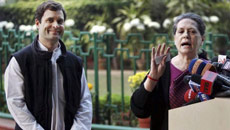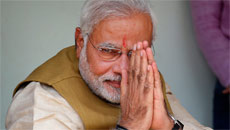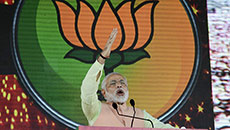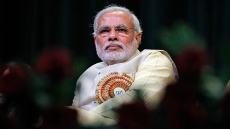A study by an international team using satellite and ground-based instruments has shown that crop residue burning, a common practice in northern India and particularly in Punjab, is contributing to atmospheric pollution over the entire Indo-Gangetic Plain (IGP) that may have climate and health implications.
"Every year, during the post-monsoon season (October-November), extensive agricultural crop residue burning takes place mainly in the northwestern Indian states of Punjab, Haryana, and western Uttar Pradesh," said Ramesh Singh of Chapman University in California and one of the authors of the study. Thanks to the north-westerly winds prevailing during the post-monsoon season, "the emissions from the burning locations travel thousands of kilometres downwind, covering the IGP from west to east," he said.
Harvesting leaves large quantities of straw in the fields. The wheat residue is usually used for animal feed, but the paddy residue is burnt in the fields, emitting large amounts of submicron aerosols and trace gases like carbon dioxide and sulphur dioxide, Ramesh Singh said.
Ground-based measurements at six locations over the IGP and observations made by US satellites were utilized in the study, which was carried out "to examine aerosol properties, smoke plume characteristics, long-range transport and affected areas during October-November 2012."
According to the findings, published in the latest issue of the Journal of Geophysical Research, smoke-laden air masses originating from Punjab due to paddy crop residue burning covered nearly the whole IGP enveloping the region with a thick aerosol layer up to a height of 2.5 kilometres. The results showed more than seven times' increase in agricultural fires over Punjab during the peak burning period (15 October to 15 November) compared to other states, indicating that paddy crop residue burning is much more common in this region.
The report said the regions mostly affected by the dense smoke plumes were the western and eastern IGP. "Sometimes, depending upon the wind direction and meteorological conditions, the plumes also influence central India, the Arabian Sea, and the Bay of Bengal, thus contributing to Asian pollution outflow."
Biomass burning, according to Ramesh Singh, is a common source of atmospheric pollution and poor air quality that has adverse impacts at the local, regional and global scales with direct short- and long-term climate implications and serious risk to human health. The impact of the agricultural burning is also evident in the regional air quality and enhanced nitrogen oxide concentrations, he said.
According to the report, aerosols over India show a mixture of emissions due to human activity, smoke from seasonal forest fires or crop residue burning, dust and particles of marine origin during the monsoon.
The Food and Agriculture Organization has estimated that, on a global scale, the burning of agricultural crop residue and clearing of forests account for about 90 percent of total wildfires mostly occurring in South Africa, Amazonia, and Southeast Asia, with India exhibiting the second highest crop residue burning (84 million tonnes a year) producing huge amounts of carbonaceous aerosols and trace gases.
The report concluded that crop residue burning in northern India was found to result in significant modification of "atmospheric gas composition, optical and radiative aerosol characteristics" that could have climate implications over northern India.
"Biomass burning over densely populated and polluted areas is of particular concern since it further contributes to the deterioration of the environment," it said.





